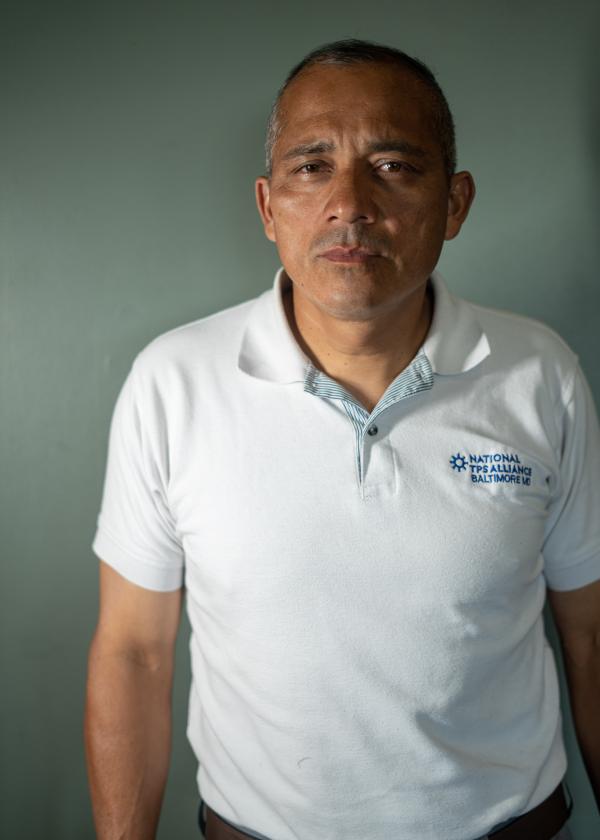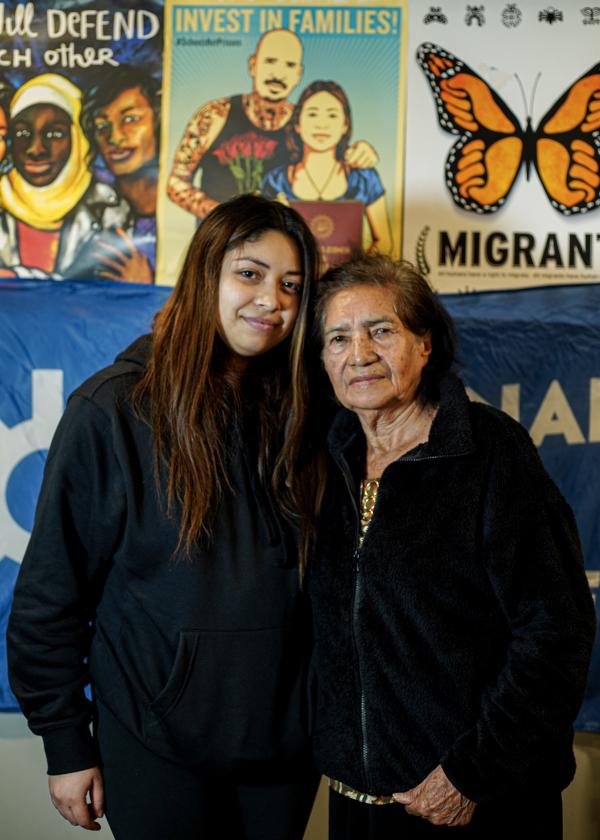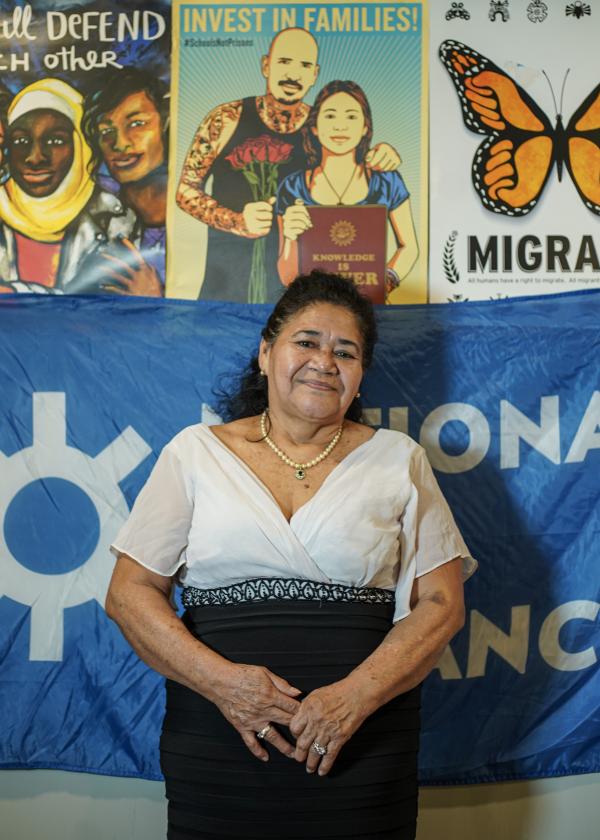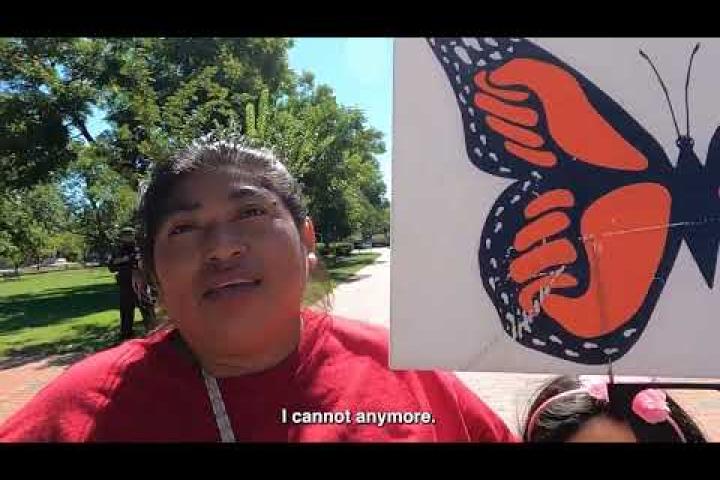This exhibit has traveled to seven locations across the U.s., highlighting the vital and timely history and present experience TPS workers face today.
News
Video
Introduction
There are approximately 325,000 fully employed Central American workers with Temporary Protective Status (TPS) in the US today. Workers with TPS have built their lives in the US. They own homes and businesses. They have worked legally for decades, paying taxes and engaging the local community. Many of them have mixed immigration family households; their children might be American citizens, DACA holders and undocumented children. They have advocated for their children's future, all while fighting for their own right to a path toward permanent residency and citizenship. They live in a state of what Dr.Campos-Medina (2019) calls bounded integration. Although TPS holders function as full members of American society, they cannot escape potential deportation and the expiration of their rights every 18 months. This research project is based on extensive empirical and field research led by Dr. Patricia Campos-Medina and all citations and background can be found on her 2019 doctoral thesis by visiting Rutgers University Libraries
What is TPS?
Temporary Protective Status (TPS) is an immigration status designated by the US Department of Homeland Security (DHS).
The status gives workers from certain countries a legal work permit, removing the immediate threat of deportation. However, TPS only gives workers a right to work legally for 6-18 months based solely on foreign policy considerations.
DHS can grant workers already living in the US humanitarian relief from deportation when conditions in their home country temporarily prevent the country's nationals from returning home. Conditions may include an ongoing armed conflict, environmental disasters, epidemics, or any other extraordinary conditions that prohibit the safe return of a national to their home country.
Salvadorans, Hondurans and Nicaraguans are among the 325,000 Central American workers who have held this status for over 25 years. These Central American migrants do not have a right to access citizenship rights after decades of legally working, paying taxes and building their lives in the US.
Timeline
The Immigration Act of 1990 authorized the creation of TPS and the US Congress designated El Salvador as the first country whose nationals could apply for TPS. Hondurans and Nicaraguans were designated for TPS in 1999 and El Salvador once again in 2001.
There are more than 325,000 Central American immigrant workers with TPS status who are the parents of more than 250,000 US born children. They have worked and lived in the US for an average of 20-25 years.4
This is the timeline of their displacement and arrival in the United States.
- 4https://immigrationforum.org/article/fact-sheet-temporary-protected-status/
Stories of Belonging
Stories of Belonging: Central American TPS Workers & the Defiant Struggle to Stay Home in the US catalogs the workplace and community experiences of TPS workers. Read more about the project and individual stories.
Portraits of Belonging: Where is home?
Central American TPS Workers & the Defiant Struggle to Stay Home in the US explores the historical engagement of TPS workers in the struggle for their rights as migrant workers, for immigrant worker justice, workplace justice, union organizing and American rights of citizenship.
After decades of living and working in the US, has the United States become their home?
And if so, does the right of migrants to stay home include their right to define for themselves where home is at this moment in their lives?
That is why I never thought that it was only temporary.
The love for my daughters made me think about how I would protect them.
I have always had that in my mind on days when I am tired and when I cannot anymore.
My strength always come from the love I have for them.
I tell them every day, because they are American citizens, this is their country.
Since its their country, I as their mother, have the right to be with them.
This then also becomes my country.
This is my home. It is the community that I am a part of where I contribute every day.

It has been in this country where I have formed my family, have my job,
my house. It’s where I have settled. I fight for TPS and permanent residency so I can stay home and have a bit of security in my life, in my children’s life.

us to now have permanent residency in the US.








Report
In progress
Resources
Credits
Stories of Belonging: Central American TPS Workers & their Defiant Struggle to Stay Home in the US
This research project is funded by the Cornell Migrations Global Challenge and the Cornell Vice Provost for International Affairs (https://migrations.cornell.edu/research/2022-grant-awards)
Grant PIs: (Authors)
Patricia Campos-Medina, PhD (https://www.ilr.cornell.edu/worker-institute/about-worker-institute#people)
Professor of Labor History Ileen DeVault
(https://www.ilr.cornell.edu/people/ileen-devault)
Sol Aramendi, Engaged Artist & Researcher
(https://www.wewomenphoto.com/artist-sol-aramendi)
Co-Investigators and Field Researchers:
Francely Flores, Independent Photojournalist and Educator: https://francelyflores.wordpress.com/
Natalia Navas, Field Researcher and Community Engagement Coordinator, nsn3@cornell.edu https://www.ilr.cornell.edu/people/natalia-navas
Student Research Support:
Julia Garcia Guell, Senior Research Assistant, ILR Graduate Student, jg2292@cornell.edu
Carly Ann Powers, WI Undergraduate Research Fellow, cap298@cornell.edu
Elle Gertaina Michel, WI Undergraduate Research Fellow, agm93@cornell.edu
Grant Administrative Support:
Anna Rivera, The Worker Institute, ILR Cornell University - Administrative Support
Maheya Afnan, The Workers Institute at ILR Cornell University - Grant Project Manager
Community Partners:
National TPS Alliance: https://www.nationaltpsalliance.org/
NDLON: https://www.nationaltpsalliance.org/
Music on videos by Lilo Gonzalez
https://lilogonzalez.com/bio/
Wind of the Spirit https://wotsnj.org/
Timeline Credits











